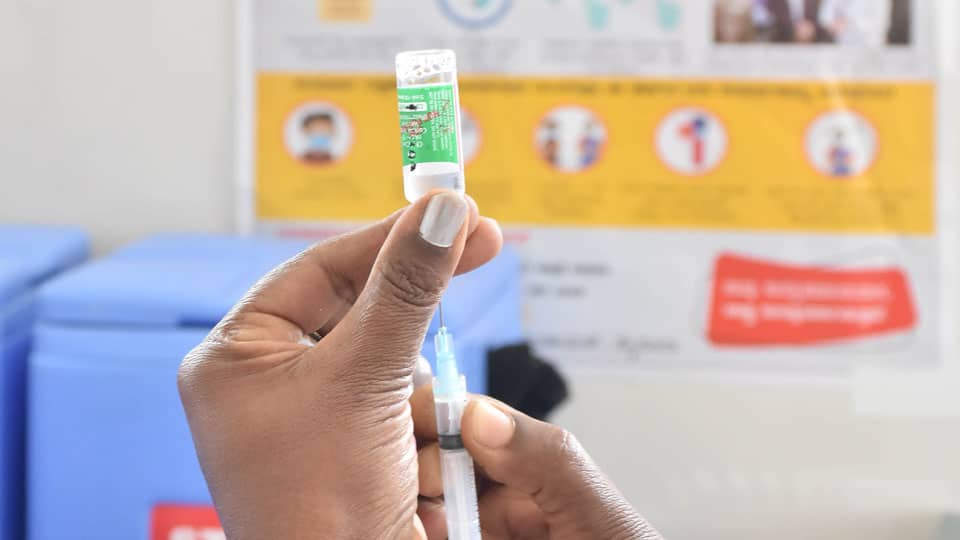By Dr. C.D. Sreenivasa Murthy
It was in March 2020 India took many harsh measures and enforced lockdowns which gradually reduced the incidence of Covid disease. As the country was feeling happy by the beginning of 2021, and slowly relaxed many restrictions, covid-19 disease has returned with greater fury and virulence. All over the world including India, vaccine discovery and production was encouraged by the Governments.
From the available data, all the vaccines presently used in many countries appear to be mostly safe and extremely efficacious. Even when there is an occasional breakthrough infection, the vaccines mitigate the effects of the disease reducing hospitalisation and mostly preventing death. So emphasis on vaccination is on the minds of the health care policy-makers. In this article some of the frequently raised doubts and questions are being discussed.
What is herd immunity?
Herd immunity, also known as population immunity, is the indirect protection from an infectious disease that happens when a large percentage of the population is immune either through vaccination or immunity developed through previous infection. WHO supports achieving ‘herd immunity’ through vaccination, and not by allowing a disease to spread through population which may result in unnecessary sufferings and deaths.
Israel has been a world leader in its vaccination roll-out, with close to 60% of its one crore population having received mRNA vaccine. Its nationwide database has already shown the vaccine to be highly effective in preventing symptoms and severe illness associated with Covid-19. This has enabled the country to relax most of the restrictions. Likewise, the UK also started its vaccine roll-out in December and has seen a dramatic decline in cases since its peak in January. Israel’s and Britain’s example gives hope to other countries trying to vaccinate vast populations.
Vaccine hesitancy, also known as anti-vaccination or anti-vax, is a reluctance or refusal to be vaccinated against contagious diseases. People who conform to this view are commonly known as “anti-vaxers.” This is for a number of reasons like personal fears and beliefs, needle phobia and misconceptions circulated through social media. In India and many parts of the world, during the initial phase of vaccine roll-out many people did not come forward to take the jabs.
What are the vaccines available in our country?
In India two vaccines are in use at present. One vaccine has been developed by AstraZeneca (AZ) in cooperation with Oxford University and produced by Serum Institute in India and is named “Covishield.” The other one “Covaxin” is a fully indigenous vaccine manufactured by Bharat Biotech with completely Indian technology.
Till now about 13 crore people have been vaccinated in India, which is the third highest in the world after US and China. Trials are on in India for Russian developed Sputnik vaccine. Probably by the end of this month we may have Sputnik and a few more vaccines, since the Government will give import licences for vaccines not made in India but being used in other countries.
Why mRNA vaccines are not available in India?
These vaccines are produced by a new technology developed by a West German company. Pfizer has developed a vaccine based on this technology. Moderna also produces mRNA vaccine. These vaccines are highly temperature-sensitive and require very cold temperatures to store them. Establishing a cold chain for such a vaccine is a very expensive and difficult proposition in our country where stable and continuous power is not available. USA, Canada and Israel use only these two vaccines, and UK has used mainly AZ vaccines.
What are the side-effects of vaccines?
Most common are pain or tenderness at the injection site, headache, tiredness, muscle or joint aches, fever, chills and nausea. The side-effects are usually mild or moderate and get better within a few days. Experiencing side-effects isn’t necessarily a bad thing. In fact, it’s a sign that our body is responding. These side-effects have been seen to be more intense after second dose.
Are there any serious side-effects?
One of the serious side-effects have been very rare cases of unusual blood clots with low blood platelets, and many times these can be fatal. As per the recent data published by Oxford scientists, the risk of clots is five per million with AZ vaccine and 4.1 per million with Pfizer/Moderna vaccine. Severe allergic reactions to vaccines are extremely unusual but can happen. Rarely myocarditis (that is inflammation of the heart) has been reported with mRNA vaccines in Israel. Of over five million people who received the vaccine in Israel, around 62 cases of myocarditis were recorded in days after the second dose of vaccine.
How long does protection from vaccines last?
Experts don’t know the answer yet, since vaccines have been in use for a few months only. While the protection from current COVID vaccines may last for at least about a year, they probably won’t offer lifelong protection as seen with measles shots. Some vaccine-makers have already hinted that a booster shot may be required every year.
Can someone get Covid after a second shot?
Coronavirus vaccines are made to protect individuals from getting infected. In the last few weeks there have been several reports of vaccinated people, even those who have received both doses, testing positive. Such cases are referred to as “breakthrough infections” indicating that the virus has been able to break through the defences created by the vaccine.
During trials, various Covid-19 vaccines have been shown to be between 75% and 95% effective. Hence some vaccinated people may get the infection. It takes about two weeks for the body to build immunity after being vaccinated, and so the chances of a person falling sick from covid during this period is the same as an unvaccinated person. Then there is the emergence of new variants of the virus.
As per ICMR (Indian Council of Medical Research) data, by April 21, 11.6 crore doses of Covishield vaccine had been administered. Among 10.03 crore people who had taken only the first dose, 17,145 had got breakthrough infection and among the 1.57 crore people who received the second dose as well, 5,014 had got infected later. Again the results are almost similar with Covaxin. The message is that it is rare to get the disease after vaccination but not impossible. Coronavirus vaccine cannot cause a COVID nasal swab to become positive. If one tests positive for COVID-19 even after being vaccinated, one should treat that positive test as an actual COVID infection.
What happens if one misses the second jab?
All the vaccines currently in use all over the world require two shots for optimum effect. The interval between the first and second dose for Covaxin is 28 days, while for Covishield it’s between four to eight weeks. The consequence of missing out the second dose is that person is not protected. Such a candidate when exposed to the infection may get infected, get the disease and may even get it severely. One can only hypothesise that the impact of a single dose of vaccine may not be as robust as a person who got a second dose. But it would still be much better than someone who is unvaccinated. Single dose does not induce strong immunity. The maximum protection can only be achieved after the second dose. The good news is the recent study results released by Oxford scientists shows that even a single shot of AZ and Pfizer vaccines cuts infection rate by 65%.
Does a person need a vaccine if he/she had Covid-19?
As of now we have no clear data to tell us how long the protection from covid-19 infection lasts. Hence all those who recover from covid illness are advised to take a vaccine to get full protection. The vaccine should be given only after full recovery from the illness.
Do children and adolescents need the vaccine?
At present no data is available and children are not being vaccinated. Trials are being conducted of youngsters aged 12 years and above. If the trials prove to be encouraging, the US Food and Drug Administration (FDA) may authorise emergency use in adolescents.
Can COVID-19 vaccine cause a positive test result for the disease, such as for a PCR or antigen test?
No, the COVID-19 vaccine will not cause a positive test result for a COVID-19 PCR or antigen laboratory test. This is because the tests check for active disease and not whether an individual is immune or not. However, because the COVID-19 vaccine prompts an immune response, it may be possible to test positive in an antibody (serology) test that measures COVID-19 immunity in an individual.
Do the vaccines protect against variants?
The COVID-19 vaccines are expected to provide at least some protection against new virus variants and are effective at preventing serious illness and death. That’s because these vaccines create a broad immune response, and any virus changes or mutations should not make vaccines completely ineffective.
What is the future evolution of Covid vaccines?
Single shot vaccines are already being developed. Johnson and Johnson have already completed the trials for a single dose vaccine and are awaiting USA FDA approval for emergency use. Vaccines that can be given in alternate routes like a tablet or as a nasal spray are being developed by many vaccine manufacturers. Researchers are also investigating the use of different combinations of vaccines to bolster an immune response with a cocktail of antigens.
Probably this disease may stay with us for a long time to come. The variants may produce frequent outbreaks of covid. If we are fortunate one of the variants may become milder and produce less severe disease. In future this vaccine may become part of the children’s vaccination schedule. Technology is advancing and vaccines that give a permanent immunity are a possibility.
“Bottom line, is that we’ve got to get the entire world vaccinated, not just our own country, otherwise every year there will be another threat as more mutants come by.” —Dr. Anthony Fauci, Chief Medical Advisor to US President Joe Biden








Recent Comments